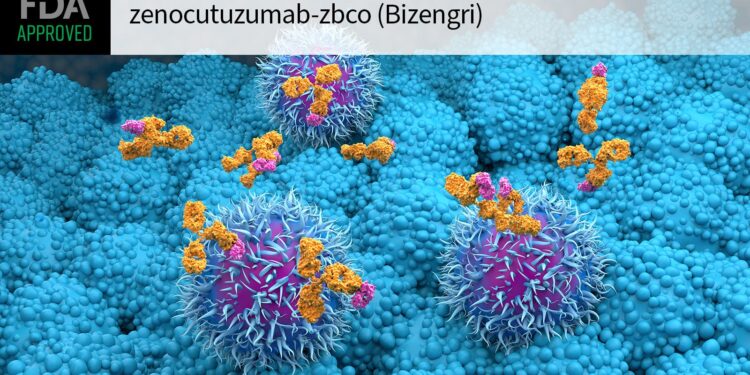The FDA granted accelerated approval to the bispecific antibody zenocutuzumab (Bizengri) for NRG1 gene fusion-positive pancreatic adenocarcinoma and non-small cell lung cancer (NSCLC) on Wednesday.
The approval stipulates use in advanced, unresectable, or metastatic disease that progressed on prior systemic therapy. Zenocutuzumab is the first approved therapy for NSCLC or pancreatic adenocarcinoma harboring an NRG1 gene fusion.
The bispecific antibody targets HER2 and HER3. The rationale for targeting HER2 and HER3 comes from recognition that NRG1 binds HER3 to induce heterodimerization with other HER/ERBB kinases, leading to increased downstream signaling and tumorigenesis. Fewer than 1% of solid tumors harbor NRG1 gene fusions.
Support for the approval came from the multicenter, open-label, multicohort eNRGy study involving 64 adults with advanced/metastatic NSCLC and 30 adults with advanced/metastatic pancreatic adenocarcinoma. All patients had NRG1 gene fusion identified by next-generation sequencing and disease progression with standard-of-care treatment.
The primary endpoint was objective response rate. The results showed that a third of patients with NSCLC responded to zenocutuzumab, and median duration of response (DOR) was 7.4 months. In the pancreatic cancer cohort, 40% of patients responded to the bispecific antibody, and DOR ranged from 3.7 to 16.6 months.
“The FDA approval of Bizengri marks an important milestone for patients with pancreatic adenocarcinoma or NSCLC that is advanced unresectable or metastatic and harbors the NRG1 gene fusion,” investigator Alison Schram, MD, of Memorial Sloan Kettering Cancer Center in New York City, said in a press release from drugmaker Merus. “I have seen firsthand how treatment with Bizengri can deliver clinically meaningful outcomes for patients.”
All-grade adverse events (AEs) occurring in ≥10% of patients included diarrhea, musculoskeletal pain, fatigue, nausea, infusion-related reactions, dyspnea, rash, constipation, vomiting, abdominal pain, and edema. Grade 3/4 laboratory abnormalities occurring in ≥10% of patients included increased gamma-glutamyl transferase and decreased hemoglobin, sodium, and platelets. The FDA required a boxed warning for embryo-fetal toxicity.
Earlier this week, Netherlands-based Merus N.V. announced a licensing agreement that grants Partner Therapeutics commercialization rights for zenocutuzumab in the U.S.
Source link : https://www.medpagetoday.com/hematologyoncology/lungcancer/113222
Author :
Publish date : 2024-12-04 22:27:31
Copyright for syndicated content belongs to the linked Source.


![author['full_name']](https://newshealth.biz/wp-content/uploads/2024/12/FDA-OKs-First-Drug-Targeting-NRG1-Gene-Fusion-in-Pancreatic.jpg)












